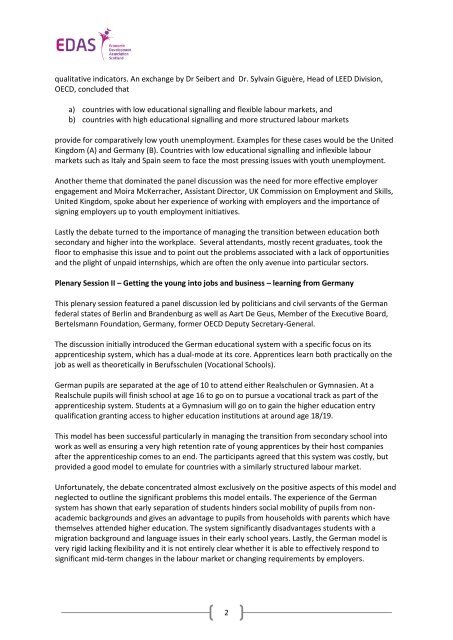Annual Meeting PARTNERSHIPS FOR YOUTH - Economic Development ...
Annual Meeting PARTNERSHIPS FOR YOUTH - Economic Development ...
Annual Meeting PARTNERSHIPS FOR YOUTH - Economic Development ...
You also want an ePaper? Increase the reach of your titles
YUMPU automatically turns print PDFs into web optimized ePapers that Google loves.
qualitative indicators. An exchange by Dr Seibert and Dr. Sylvain Giguère, Head of LEED Division,<br />
OECD, concluded that<br />
a) countries with low educational signalling and flexible labour markets, and<br />
b) countries with high educational signalling and more structured labour markets<br />
provide for comparatively low youth unemployment. Examples for these cases would be the United<br />
Kingdom (A) and Germany (B). Countries with low educational signalling and inflexible labour<br />
markets such as Italy and Spain seem to face the most pressing issues with youth unemployment.<br />
Another theme that dominated the panel discussion was the need for more effective employer<br />
engagement and Moira McKerracher, Assistant Director, UK Commission on Employment and Skills,<br />
United Kingdom, spoke about her experience of working with employers and the importance of<br />
signing employers up to youth employment initiatives.<br />
Lastly the debate turned to the importance of managing the transition between education both<br />
secondary and higher into the workplace. Several attendants, mostly recent graduates, took the<br />
floor to emphasise this issue and to point out the problems associated with a lack of opportunities<br />
and the plight of unpaid internships, which are often the only avenue into particular sectors.<br />
Plenary Session II – Getting the young into jobs and business – learning from Germany<br />
This plenary session featured a panel discussion led by politicians and civil servants of the German<br />
federal states of Berlin and Brandenburg as well as Aart De Geus, Member of the Executive Board,<br />
Bertelsmann Foundation, Germany, former OECD Deputy Secretary-General.<br />
The discussion initially introduced the German educational system with a specific focus on its<br />
apprenticeship system, which has a dual-mode at its core. Apprentices learn both practically on the<br />
job as well as theoretically in Berufsschulen (Vocational Schools).<br />
German pupils are separated at the age of 10 to attend either Realschulen or Gymnasien. At a<br />
Realschule pupils will finish school at age 16 to go on to pursue a vocational track as part of the<br />
apprenticeship system. Students at a Gymnasium will go on to gain the higher education entry<br />
qualification granting access to higher education institutions at around age 18/19.<br />
This model has been successful particularly in managing the transition from secondary school into<br />
work as well as ensuring a very high retention rate of young apprentices by their host companies<br />
after the apprenticeship comes to an end. The participants agreed that this system was costly, but<br />
provided a good model to emulate for countries with a similarly structured labour market.<br />
Unfortunately, the debate concentrated almost exclusively on the positive aspects of this model and<br />
neglected to outline the significant problems this model entails. The experience of the German<br />
system has shown that early separation of students hinders social mobility of pupils from nonacademic<br />
backgrounds and gives an advantage to pupils from households with parents which have<br />
themselves attended higher education. The system significantly disadvantages students with a<br />
migration background and language issues in their early school years. Lastly, the German model is<br />
very rigid lacking flexibility and it is not entirely clear whether it is able to effectively respond to<br />
significant mid-term changes in the labour market or changing requirements by employers.<br />
2


